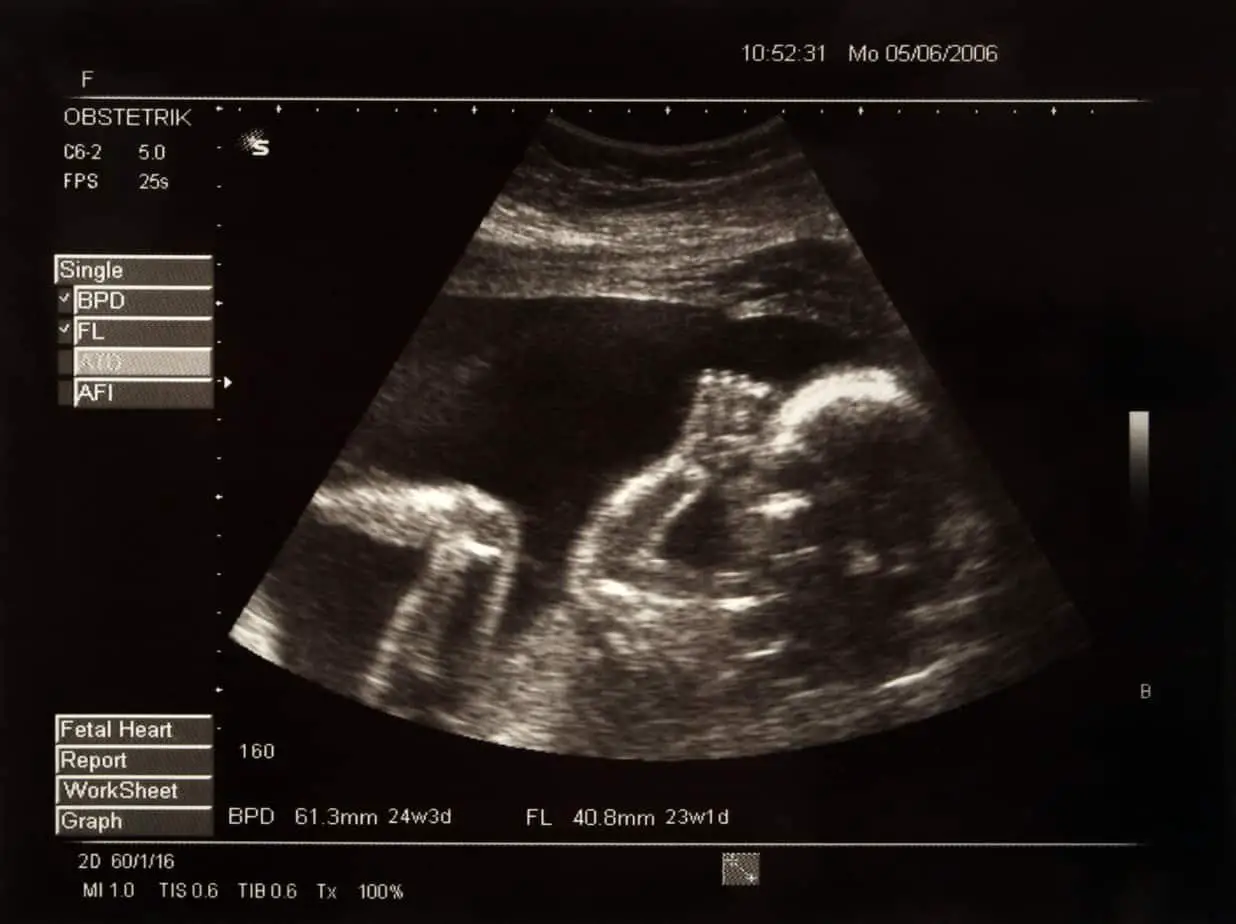
As your baby grows during pregnancy, you get accustomed to more and more movement. Rolls, kicks, and elbows become common and a sign that your baby is healthy and active.
But every once in a while, you might feel something new. If you start to feel a rhythmic bounce, spasm, or tap, it’s likely your little one has developed a case of the hiccups.
While fetal hiccups are perfectly normal, they can make it difficult to focus or relax, especially if you’re trying to sleep or make it through your workday. You might be wondering, is there any way to stop baby hiccups in the womb?
Well, just like when you get the hiccups, there’s no foolproof way to stop them. But don’t worry, there are a few different strategies you can try.
What Causes Hiccups in the Womb?

While no one is 100% sure what causes them, researchers have a few theories about fetal hiccups and, believe it or not, they’re usually considered a good sign.
One explanation for them is that the baby’s diaphragm has developed enough that she’s able to start practicing breathing by inhaling and exhaling amniotic fluid. Although this occurs toward the end of your first trimester, you won’t feel them until a few weeks later when the baby is a bit bigger.
Another reason hiccups can be a good thing is the confirm that the nerves controlling the diaphragm are developed and working properly.
Basically, they demonstrate that your baby is continuing to develop in ways to help her survive outside of the womb.
Some researchers believe that hiccups are simply a result of other reflexes developing and your baby’s continuing ability to learn new things. Whatever the cause, there’s generally no reason to worry.
When Is It Abnormal?
Fetal hiccups can signal some serious complications later in pregnancy that you should be aware of.
If you’re in your third trimester and notice that your baby’s hiccups have increased in frequency or strength or if they continue to persist as you near your due date or accompany other changes in fetal movements, it could be a sign that there is a problem with the umbilical cord.
Cord compression or prolapse are complications that happen toward the end of pregnancy when the baby has grown big enough that movement is restricted.
Cord issues are a great cause for concern because they cause changes in the baby’s blood pressure and heart rate. This leads to less oxygen in the blood which can cause brain damage or worse.
While this can undoubtedly be scary, there are some specific things you can look out for to set your mind at ease.
First, there’s no reason to be concerned until after your 28th week of pregnancy. At that point, if your baby gets hiccups more than 4 times a day or if you notice that they are stronger or last longer than usual, contact your doctor, just to be safe.
How to Stop Baby Hiccups in the Womb

There’s no guaranteed method for stopping hiccups in the womb, but there are a few different things you can try.
Eat protein-rich foods as they can help the baby relax. Protein is necessary for cell growth and development. As your baby grows, more protein is needed to help with development and is especially important for the proper functioning of muscles. Since the diaphragm is a muscle, having the right amount of protein intake can help it function properly and potentially lessen the occurrence of hiccups in the womb.
Stay hydrated. Your body needs a lot more water when your pregnant than it does normally. Begin dehydrated can have all kinds of effects on your baby’s well-being as well as your own. Sometimes, a few extra glasses of water are enough to make a huge difference.
Perform pelvic rocks to try to shift the baby into a different position. If your baby is uncomfortable, hiccups might occur. Pelvic thrusts are one way to try to move your baby into a position that’s more comfortable for her.
Make sure you’re getting enough rest. When you’re tired, you can become very stressed which will directly affect your baby. When you get enough sleep, your mood improves, and stress levels drop. All of these things help your baby relax and can help stop fetal hiccups.
Don’t hold your breath as you might do to relieve your own hiccups as it won’t have any effect on the baby. Remember, continue kick counts and pay special attention to hiccups that continue or get worse into the third trimester.
Other Ways to Get Relief
If nothing is working, keep in mind that most episodes of fetal hiccups only last for about 15 minutes. In the meantime, there are some things you can do to make yourself more comfortable that may also help the hiccups stop.
Get enough rest
Try lying down on your left side
Use a pregnancy pillow to help support your bump to relieve back pain and pressure
Do mild to moderate exercise as you are able
Drink plenty of water
Conclusion
Most of the time, hiccups in the womb are nothing to worry about, but they can be distracting and keep you up at night in a time when you really need your rest. While there’s no definitive way to make them stop, there are some simple things you can try.
Basically, the most important things you can do are make sure you’re eating a protein-rich, healthy diet and staying hydrated. Pelvic rocking can help, too, because you could shift the position of the baby which may help the hiccups stop.
Have you experienced and fetal hiccups in your pregnancy? What did it feel like? Do you have any tips and trick to share? Comment below!



1 comment
When I was Pregnant 30 years ago and he
got Hiccups in the Womb I would just Tapped
My Belly and Joe would calm down and I Think
That he would Go To Sleep!
No more Babies for me except for Grandchildren!
I have a 3 Years 7 Months Old Her Name is Asha Renee Asha means Hope in India!